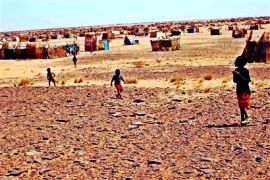Sudanese authorities force displaced into desert area outside capital
By Amil Khan
Sept 9, 2005 (AL-FATEH) — A group of Sudanese standing among plastic-covered shacks in the desert said they lost their homes and most of their belongings when the police drove them from the capital.
 “The police came in trucks very early in the morning. They gave us a few minutes to pack what we could carry and then they burnt down our homes,” said Arob Tuul, a carpenter who was forced to al-Fateh from Shaikan, around 10 km away.
“The police came in trucks very early in the morning. They gave us a few minutes to pack what we could carry and then they burnt down our homes,” said Arob Tuul, a carpenter who was forced to al-Fateh from Shaikan, around 10 km away.
“Police beat some people and threatened to kill some of the young men if they didn’t leave their belongings behind,” said John, a southern Sudanese man born in Khartoum after his family fled a recently ended civil war.
They said police trucks arrive daily bringing people from a lower-income Khartoum neighbourhood called Shaikan to their new homes in the desert around 40 km (25 miles) north west of the capital.
Aid officials say Khartoum has decided to turn al-Fateh, a large expanse of desert, into a new residential area.
“Moving people to al-Fateh is part of an effort by the Khartoum authorities to re-zone the city and avoid congestion … The problem is how they are doing it,” one aid worker told Reuters.
“People were basically dumped in the middle of the desert. There is no planning for providing them with the most basic infrastructure,” the aid worker added.
Police officials said on Friday they could not comment since Khartoum local authority was running the operation to move people to al-Fateh. Officials from the office of Khartoum’s governor were not immediately available for comment.
Those living under plastic-sheeting in temperatures of over 40 degrees Celsius (104 Fahrenheit) said they had no access to employment, education or health services in the area.
“TREATED LIKE ANIMALS”
The area is split into three parts. Residents in al-Fateh 1 said they have lived there for around 10 years and residents in al-Fateh 2 said they had been there for around five years.
Both areas have single-storey mud-brick houses, which are mainly uncompleted, but there are also shelters made of plastic sheeting and wooden rods.
The police trucks have been bringing the newest arrivals to al-Fateh 3, the area with the least facilities, over the past 25 days. Around 3,000 people live in shacks in al-Fateh 3.
Aid groups are providing some relief to the people in al-Fateh 3 but want to avoid being seen to absolve Khartoum authorities of responsibility, aid officials told Reuters.
“We want to stop being treated like animals,” said Shaheeda, a mother of three who did not want to give her full name.
Aid workers said the authorities had promised land to the people they have moved to al-Fateh and some of those in al-Fateh 3 showed slips of paper saying they were entitled to a plot.
“We hear these promises of land from officials but you only get the land if you have money to pay them … None of us have any money,” said Abu Jeel, a grandfather who originally came from the south.
Another resident, Luka said: “This is really like death.”
(Reuters)
